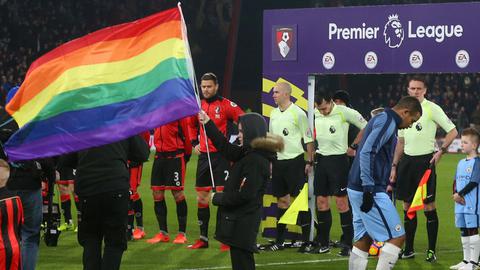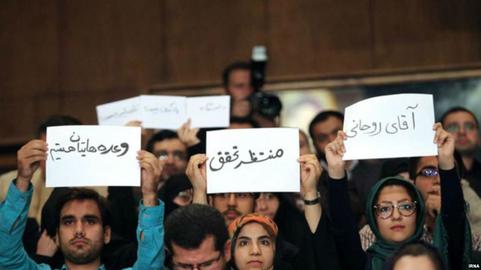After a week-long hiatus, European football is back on Iranian state-run TV.
For an entire week, the Islamic Republic of Iran Broadcasting (IRIB) not only refused to broadcast football matches from the English, Spanish, Italian and French leagues, but it also limited short clips about football, often showing short, jumpy footage that wasn’t easy to watch. The reason? European football team captains were wearing rainbow armbands throughout the week — and it was not something the state broadcaster wanted its audience to see.
For the first time, the Union of European Football Associations (UEFA) had appealed to its member federations and clubs to ask their captains to wear rainbow armbands to show their support for the worldwide LGBT community. The move was initiated following the election of Aleksander Čeferin to the UEFA presidency in September 2016. When he was elected, he also automatically became a FIFA vice president.
Čeferin was born in 1967 in the Slovenian city of Grosuplje in what was then the Socialist Federal Republic of Yugoslavia. He followed his father into the law profession, although he ended up working in a somewhat different area of law with different kinds of clients. While working for his family’s law firm Čeferin developed a particular interest in representing professional athletes and sports clubs.
He first took a formal interest in local football in 2005 through his work with the executive board of one of Slovenia's most successful futsal clubs. Soon he made a name for himself after he won numerous court battles at international tribunals including the Court of Arbitration for Sport (CAS). As early as 2006 he decried corruption at FIFA and in 2007 he condemned the Nigerian military’s treatment of footballers during league competitions and called for the Nigerian Football Federation to be suspended.
In 2009 Čeferin forcefully advocated for financial fair play (FFP) rules that aim to prevent clubs that qualify for UEFA competitions from spending beyond their means. He said that if these rules were not put in place European football would become a hub for corrupt money launderers from East Asia and the Middle East. From 2011 to 2016, Čeferin served as a second and third vice-chairman of the UEFA Legal Committee.
Racists and Homophobes Are not Welcome
There can be no doubt that Čeferin loves to talk, is well spoken and is not immune to riding intellectual waves. In 2016, he reached the top position in UEFA and set out to fulfil his promises about human rights. In July 2017, UEFA announced that it would fine and punish referees who failed to stand up to football fans who shout racist chants during matches in Europe. The referees were told that in such a situation they must stop the game completely or pause it until things calmed down. “I can tell you here without the slightest hesitation: I will never spare any effort to stamp out the scourges of match-fixing, hooliganism, discrimination and sexual abuse in sport,” Čeferin said in September at a ceremony to sign an agreement with the Council of Europe to protect and promote the values of European football. He cited the “duty to preserve football for all, regardless of religion, color or political opinion” as one of these values.
With Čeferin at the helm, UEFA secured an agreement from all its member federations to support the rights of the LGBT community and for a whole week all European captains wore a rainbow armband when competing. This is what led the IRIB to stop live broadcasts of the competitions.
“Higher-Ups” Nix It
On Friday, November 30, IRIB’s sports network suddenly changed its schedule. Three English Premier League games were removed. The most important was the match between Everton and Liverpool. Reporters could not get any answers as to why the network had canceled the live broadcast of the three games. “The order came from higher up,” was the only explanation they received.
The reference to “higher up,” however, was not about the office of Ehsan Shia, the director of IRIB’s sports TV network. Shia has flouted bans at the IRIB in the past. For instance, when Alireza Faghani, the Iranian international referee, returned from the 2018 FIFA World Cup in Russia, he embraced his sister at the airport, which got him into trouble with IRIB bosses. For a while IRIB networks refused to show any images of Afghani, but Ehsan Shia did not follow suit. “I think that when Afghani was in Russia the sports network covered him extensively and we interviewed him more than anybody else did,” he told Mehr News Agency. “The ban on Afghani’s pictures is just talk — and we don’t care about such talk.”
Over the summer he told the news site Iran Online: “For the first time we have bought the right [to broadcast live] all English Premier League competitions. And the reason is clear. We want the Iranian people to see Alireza Jahanbakhsh whenever he goes to the field for his team [Brighton & Hove Albion FC].” This was one of the very few times that the directors had agreed to pay for the live broadcast of European league competition games.
Because the Council Says So
Nevertheless, Ehsan Shia had no choice but obey the order from the “higher ups” and remove the live broadcast of European league games from his network’s schedule. The higher up, in this case, was the IRIB Supervisory Council.
A producer for Iranian TV’s sports network told IranWire that the power to order English, Spanish, French and Italian premier league games to not be broadcast did not rest with Iranian TV’s networks directors. “What we learned was that Thursday afternoon they called from the Supervisory Board office and told the managers of the sports and third networks that no game was to be broadcast, either live or with a delay.” Apparently they were also told that nothing showing the rainbow flag must be aired.
The IRIB Supervisory Council was formed according to Article 175 of the constitution, which states: “The appointment and dismissal of the head of the Radio and Television of the Islamic Republic of Iran rests with the Leader. A council consisting of two representatives for the president, the head of the judiciary branch and the Islamic parliament shall supervise the functioning of this organization.”
The lion’s share of grandstanding in this council, however, goes to Ehsan Ghazizadeh Hashemi, who used to be the director of Tehran’s Bureau of Culture and Islamic Guidance, was the Director General of the Press and Domestic News Agencies at the Ministry of Culture and Islamic Guidance and is currently a representative to the parliament from the city of Sarakhs in the northeastern province of South Khorasan. Despite his obvious experience in Iranian media matters, the main reason for his power is to do with his family connections. He is the younger brother of Amir-Hossein Ghazizadeh Hashemi, who was a member of the parliament’s directorate for eight years and he is a cousin to Hassan Ghazizadeh Hashemi, President Rouhani’s minister of health.
Recently, the Islamic Republic enacted a law that bars individuals who have reached retirement age from staying in government jobs. Mehdi Taj, head of Iran’s Football Federation, is one of them, and this has raised fears that FIFA might suspend the Iranian federation because it opposes any interference from governments in the affairs of its member federations. Ghazizadeh Hashemi, who has dismissed the idea that there is any danger the federation might be punished, has become a target of Iranian sports critics. Nevertheless, he has used his position as a member of the IRIB Supervisory Council to pressure all heads of sports federations at the age of retirement to leave their jobs. He was also the first to voice opposition to last week’s European football games being shown because of UEFA’s expression of support for the LGBT community.
Following on from the week without football broadcasts, Rasoul Majidi, a TV presenter at IRIB, published on Twitter the schedule of European league competitions that will be broadcast live by Iranian sports TV [Persian link]. This week, the captains of European leagues are not wearing their rainbow armbands. So Ghazizadeh will probably once again return his attention to the issue of the heads of sports federations who have reached retirement age.
For a week, perhaps, Iranians will be able to watch European football in peace.
More on censorship in Iran:
Banning Cucumbers and Wet Bisons: Absurd Censorship in Iran, September 10, 2018
The Ban on Telegram, April 30, 2018
Iran Censors Rome’s Ancient She-Wolf, April 7, 2018
“Traitor” Journalist Suspended and Demoted for Tweet, February 16, 2018
, September 28, 2018
Censorship and Self-Censorship During the Protests, December 31, 2017
Why Does Iranian State TV Censor Movie Trailers?, December 7, 2017
Iran’s Authorities in New Crackdown on Journalists, October 17, 2017
The Menace of Censorship, July 26, 2017
The Censorship of Forced Hijab, June 22, 2017
Iranian Cartoonist "Tired of Living a Criminal Life", May 25, 2017
World Press Freedom Day: Iran's Journalists Face Arbitrary Arrest and Persecution, May 3, 2017
Iran State Media “Lawless”, April 10, 2017
Shirin Ebadi: With Advances in Technology Come Advances in Censorship, March 7, 2017
visit the accountability section
In this section of Iran Wire, you can contact the officials and launch your campaign for various problems

























comments